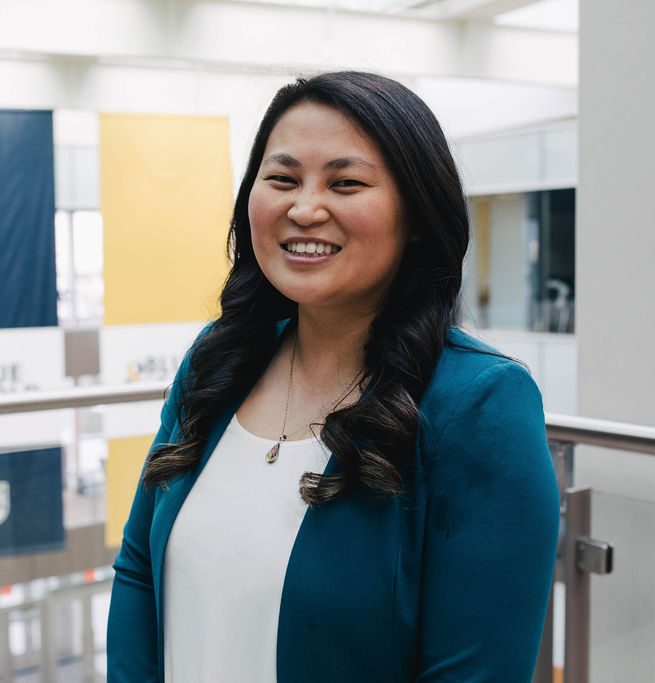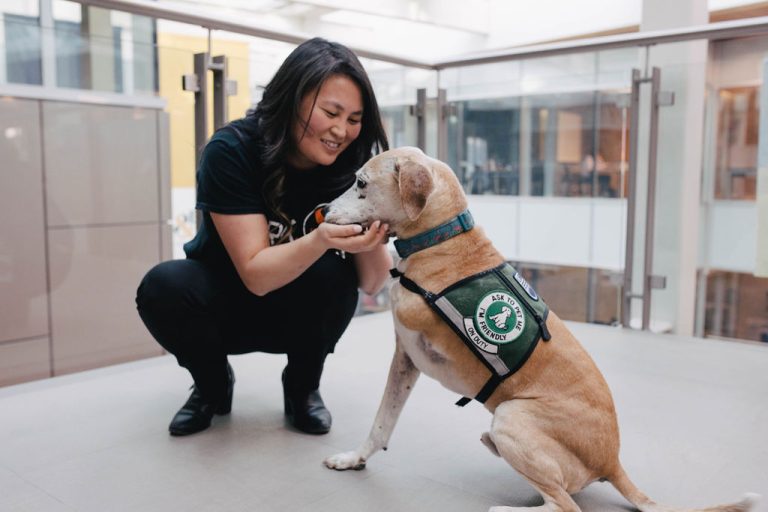 NAME:
NAME:
Camille Xinmei Rousseau
PROGRAM:
PhD in Interdisciplinary Graduate Studies, Individualized Stream
RESEARCH SUPERVISOR(S):
Dr. John-Tyler Binfet
HOMETOWN:
Gatineau, QC
AWARDS:
2022 Doctoral Studies Outstanding Publication Award from the Okanagan School of Education
2022 ISAZ Diversity Equity and Inclusion (DEI) Award from the International Society for Anthrozoology (ISAZ)
UBC Okanagan Public Scholar
RESEARCH DESCRIPTION
Building on my expertise in canine-assisted interventions (CAI) for children’s reading development, my doctoral work brings together teachers, students, and volunteer dog handlers to develop a therapy dog program titled Pups Uplifting Public Speaking (P.U.P.S.) Competence for children with public speaking (PS) anxiety.
PS anxiety becomes pronounced between the ages of 10-14 years (Field et al., 2003) and affects up to 70% of the population (Dwyer & Davidson, 2012). It can impair social functioning, hinder overall life satisfaction (Emanuel, 2005; Pull, 2012), and limit professional attainment (Morreale et al., 2017; van Ginkel et al., 2015), It is also a skill undergirding academic achievement and an assessment tool to appraise students (British Columbia Ministry of Education, n.d.). Given the importance of PS and the lack of interventions for children, it is essential to develop engaging low-cost and low barrier methods that promote children’s PS competence (Ebrahimi et al., 2019; Herbein et al., 2018).
A promising intervention for PS is CAIs, which have demonstrated efficacy in reducing stress and anxiety across a wide range of contexts and clients (Crossman, 2017; Crossman et al., 2018). Dogs play an important role in supporting children’s socio-emotional and educational development by fostering an environment of warmth and acceptance that encourages children to take risks (Levinson, 1987; Mueller, 2014), thus acting as social lubricants facilitating communication and rapport among individuals (Levinson, 1987). Benefits may extend to the PS context, however an extant review of the psychological, educational, and anthrozoological literature reveals that no research has explored CAIs as a strategy to reduce PS anxiety.
To address the call for interventions promoting PS competence and building on the success of canine-assisted reading interventions, my doctoral research aims to develop the Pups Uplifting Public Speaking (P.U.P.S.) Competence, an evidence-based CAI program for children with PS anxiety. This research includes three distinct phases. Phase 1 captures the lived experiences of key stakeholders in three distinct studies. Study 1 explores 15 grade 6 and 7 teachers’ experiences with PS in the classroom through focus group discussions. Study 2 explores 12 grade 6 and 7 students’ experiences with PS anxiety and strategies to reduce it through semi-structured interviews. Study 3 explores 13 dog handlers’ experiences of CAIs with children using an online, open-ended survey.
Phase 2 aims to develop the curriculum for P.U.P.S. Competence. This phase includes consultations with teachers and handlers. Giving a voice to stakeholders throughout the program development, whilst also aligning with B.C. curriculum requirements, is essential to ensure that the evidence-based program is driven by the community.
To verify the feasibility of the program, Phase 3 will involve the implementation of the P.U.P.S Competence program. A triangulated data collection method will be used to assess formative and summative participant self-ratings of PS competence, program instructor observations, and dog-handler observations. Participants will be asked to provide feedback after each session by filling out a short questionnaire. This final phase will help me assess whether the intervention was successful in supporting children with PS anxiety.
WHAT DOES BEING A PUBLIC SCHOLAR MEAN TO YOU?
Being a public scholar means having the opportunity to engage in collaborative scholarly work with and for members of our Okanagan community. It provides me with the opportunity to bridge the gap between research and practice through the cross-pollination of ideas, the co-development of innovations, and shared benefits for scholarship and community. Public scholarship promotes new pathways to foster meaningful relationships with the Okanagan community and a commitment to responsible change for young people.
IN WHAT WAYS DO YOU THINK THE PHD EXPERIENCE CAN BE RE-IMAGINED WITH THE PUBLIC SCHOLARS INITIATIVE?
The PSI celebrates the doctoral endeavours of PhD students and candidates who engage in non-conventional scholarly activities or different forms of scholarship immediately contributing to the public good through innovative and social gains. In this way, it allows students to move beyond traditional doctoral experiences in academia and offers a comprehensive and holistic experience.
Public scholarship affords me the flexibility to foster innovative interdisciplinary intersections between human-animal interaction research and the school-based experiences of scholar-practitioners in my community.
HOW DO YOU ENVISION CONNECTING YOUR PHD WORK WITH BROADER CAREER POSSIBILITIES?
My graduate experiences could lead me to a career that allows me to be part of the effort to bridge the gap between academia and the community.
I envision a future for myself in which I am an interdisciplinary researcher, community partner, and program consultant for community-based CAI programs. I am hopeful that my career will allow me to collaborate with scholars and community associates. There is a growing interest in CAIs in learning spaces and my advanced understanding of CAIs positions me well to monitor these efforts. My doctoral research has allowed me to hone scholarship skills, engage in CAI program development, and deliver and practice community-building skills, which are central to the success of CAIs.
HOW DOES YOUR RESEARCH ENGAGE WITH THE LARGER COMMUNITY AND SOCIAL PARTNERS?
This research project is developed for and with key stakeholders from the larger Okanagan community. Throughout each phase

Camille pictured with a dog from UBC Okanagan’s Building Academic Retention through K9s (B.A.R.K.) program.
of the project, key stakeholders play an active role in the development and examination of the P.U.P.S. Competence program. In Phase 1, I capture the lived experiences of grade 6-7 teachers (study 1 on PS), grade 6-7 students (study 2 on PSA), and volunteer dog handlers (study 3 on CAIs). The data for each of these studies informs the development of the P.U.P.S. Competence program in Phase 2. As the curriculum for the program is developed in Phase 2, giving a voice to stakeholders through a form of member checking facilitates alignment with B.C. curriculum requirements as well as community wonderings and expectancies for the program. Equally, it is also important to evaluate that the programs established is received as intended. Accordingly, Phase 3 aims to verify the feasibility of the program. Through the implementation of the P.U.P.S Competence program, community stakeholders such as students and handlers will play an active role in appraising how the intervention is experienced. In this way, stakeholders, throughout every phase of this study, ensure that the evidence-based program is driven by the community it is meant to support.
HOW DO YOU HOPE YOUR WORK CAN MAKE A CONTRIBUTION TO THE PUBLIC GOOD?
PS anxiety is a problem that transcends traditional disciplinary boundaries. It follows that the solution should have an interdisciplinary approach. This research holds the potential to contribute to the public good by transcending the disciplinary boundaries of psychology, education, and human-animal interactions and by working closely with the Okanagan community to develop a program tailored to its needs. Further, the benefits of the proposed research extend beyond academia and will inform parents, educators, and children about how best to bolster PS proficiency. This research project also deepens an established relationship with local teachers from School District 23, supports the emotional and academic development of local students, and allows me to liaise with UBC’s B.A.R.K. program
WHY DID YOU DECIDE TO PURSUE A GRADUATE DEGREE?
I am passionate about community-driven CAI programs, particularly those supporting children in learning contexts. Still, there is a disconnect between research and practice. I am cognizant that I still have a lot to learn about the role these companion animals play in supporting children across learning contexts. I sought to pursue this interdisciplinary degree to reach an advanced understanding in CAIs and advance CAI scholarship.
Further, I aspire to raise Canada’s profile in CAI research and to support the advancement of human-animal interactions (HAI) an academic field of study for undergraduate and graduate students. The field of HAI is burgeoning in the United States, with many academic institutions offering scholars from various disciplines space to come together and have conversations on this area of study in new HAI focused departments. I would like to help give Canadian institutions a reason to establish HAI departments and advocate for research relevant to our Canadian context.
WHY DID YOU CHOOSE TO COME TO UBC OKANAGAN AND STUDY?
I was inspired by Dr. John-Tyler Binfet, founder and director of UBC Okanagan’s Building Academic Retention through K9s (B.A.R.K.) program (2012), to continue my academic journey at UBC and work with the B.A.R.K. lab. B.A.R.K. is a world-renowned, innovative research hub for canine-assisted intervention research. As the largest on-campus canine visitation program in Western Canada, it draws international students to its humble campus and also services unique populations including law enforcement personnel and children. I am deeply grateful to be able a part of it. Moreover, as noted above, advanced degrees in human-animal interactions are not offered in Canada. Pursuing a Doctor of Philosophy in Interdisciplinary Studies at the University of British Columbia, Okanagan campus (UBC Okanagan) has provided me with the opportunity to build on my multidisciplinary background in child and youth studies, CAIs, and psychology, to customize my studies, and to receive advanced training in CAIs and PS anxiety.
Camille Xinmei Rousseau is a UBC Okanagan Public Scholar. Learn more about the Public Scholars Initiative (PSI).